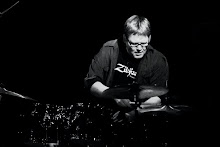Hello,
I just had a very positive experience playing what's known around these parts as a Jazz Jobber. A "Jobber' or "Jobbing Gig" would be defined as any engagement where you're playing ambient music for an event. Around Montreal they call these gigs "Club Dates".
As I mentioned, I has a great time at the gig last night. The clients (it was a wedding) did everything right. They were very relaxed, they trusted us to do our thing and let us do it, they fed us, etc. etc. They couldn't have been nicer or easier to deal with. Now certainly, every gig of this type isn't always this easy or fun, but there's also a lot we as musicians can do to make it go smoothly. I'm also going to point out some common errors I feel people make in this type of gig environment.
1. Remember your purpose for being there.
Pretty well everything else I mention could fit under this main category. Whatever the even you're playing, be it wedding, fashion show, etc. You are not the centre 0f attention. Just as whoever does the floral arrangement, makes the meal, etc. Keep this in mind and you'll be a lot less frustrated and better fulfill your job.
2. Make sure your payment is in line with the gig.
This is also a way to keep yourself from being frustrated. These sort of jobs where you're not being paid close attention to should pay more than when you're playing for a strictly listening crowd. As soon as I'm in a situation where I absolutely have to wear a suit and I'm playing an event hall or a synagogue rather than a club, I generally expect to be paid more.
3. Leave your new symphonic work at home.
Okay, I'm being a bit facetious, but it's unbelievable how many times I've played an event and someone wants to play all original music. This is not why you're there! In the case of a "Jazz Jobber" this is a chance to polish up your "Great American Songbook" repertoire. By that I mean, tunes by Gershwin, Cole Porter, and the like and they should be memorized! I sometimes play with someone who has a book of original tunes and we played an event where the power stayed on but the lights went out. Since this person didn't know any standard tunes, we were stuck until we had light again. In a more experienced band the conversation might have went something like, "Do you know It had to be you?" " Sure, what key?" " I dunno, F?" "Sure". I often tell bands I coach that a lot of what I call "Broadway Standards" can function on Jazz gigs and Jobbers.
4. You will be ignored. Revel in it!
I also was in a situation where the bandleader was miffed that people at the wedding weren't clapping for our solos! This floored me! At a lot of these events people are experiencing life changing events and are seeing friends and family that they may have not seen in years. It doesn't matter if you're playing bass or we had a seance and brought back Paul Chambers. They have other concerns besides your hot solo!!! I've mentioned this before but the "flying under the radar" quality of these gigs actually offers a lot of freedom in a way. As long as you're playing standards you can can go for it within those confines as long as you.....
5. Don't play too loud.
This is essential. if people can't visit while you're playing, they won't be happy and you won't get hired again. For us drummers this is great for working on brushes or playing delicately with sticks. View it as a fun challenge and get your low volume chops together!
Alright, now put on your suit, be prepared to eat some good food, play soft, hang with your musician friends and play some standards. Not a bad way to make some $, is it?

